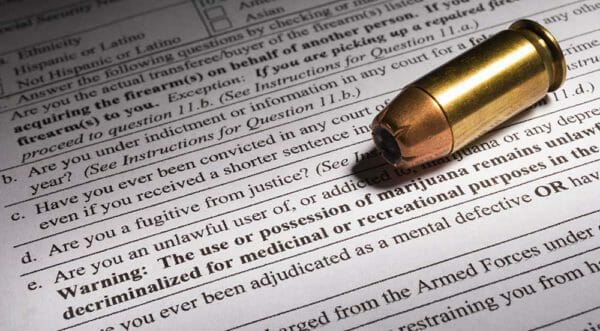
A three-judge panel from the Court of Appeals for the Tenth Circuit ruled that the law banning the users of marijuana from owning firearms is unconstitutional.
The case, United States v. Harrison, involves a Lawton, Oklahoma man, named Jared Harrison, who was arrested for owning a gun and being an “unlawful user of or addicted to any controlled substance.”
In 2022, he was pulled over by a law enforcement officer from the Lawton, Oklahoma Police Department for running a red light. When Harrison rolled down his window, the officer claimed he smelled the scent of marijuana. The man informed the officer that he worked at a medical marijuana dispensary. When asked if he had a state-issued medical marijuana card, Harrison told the officer he did not. The officer asked him to step out of the car, and Harrison complied with the demand.
Instead of performing a field sobriety test or administering a blood test for drugs on Harrison, the officer used the smell of marijuana as probable cause to search the man’s vehicle with another officer who arrived on the scene after Harrison was removed from the vehicle. During the search of the car, officers found a loaded revolver, marijuana residue, marijuana cigarettes, and THC gummies. THC is the main active chemical in marijuana. The officers arrested Harrison, and a grand jury would indict him on August 17, 2022.
After the indictment, Mr. Harrison moved to dismiss the case, claiming that the law banning marijuana users from owning guns “unconstitutionally infringes on an individual’s right to bear arms under the Second Amendment.” He also argued at the District Court level that the law is unconstitutionally vague in violation of the Fifth Amendment. The District Court did not address the second claim because it found in favor of the defendant on the first claim, thereby eliminating the need to address the second claim. The government would appeal the decision to the Tenth Circuit Court of Appeals; however, neither side addressed the Fifth Amendment challenge, instead focusing solely on the Second Amendment challenge.
The three-judge panel would use the Bruen framework to examine the constitutionality of the law prohibiting marijuana users from owning firearms. The first step is to look at the original text of the Second Amendment. Mr. Harrison is an American citizen over the age of 18, which, according to Harrison, makes him part of “the people.”
The government tried to argue that since Harrison broke the law, he is not “law-abiding” and therefore not part of “the people.” The judges rejected this argument, saying that “the people” refers to “at least all Americans,” whether they are law-abiding or not. The government cannot ban sacred text from those who commit crimes, and even the most hardened criminals have the right to remain silent. According to Supreme Court Associate Justice Clarence Thomas, the courts can no longer treat the Second Amendment as a second-class right. The gun in question is bearable and therefore a protected arm. Since the conduct is protected, it is presumably Constitutional.
In step two of a Bruen analysis, the government must provide historical analogues from the founding era that show a gun law is consistent with the history and tradition of the nation’s firearms regulations.
The government tried to sidestep the fact that there are no historical analogues by citing the Rahimi Supreme Court case. In that case, the Justices ruled that a person could be temporarily disarmed if they are a danger to themselves or others, but did not specify what they considered to be “temporarily.” The judges in this case pushed back because just being a user of marijuana doesn’t mean you are a danger to yourself or others. They said the government must prove that a non-intoxicated user of marijuana is a danger to themselves or others before they could restrict the right to keep and bear arms. Since they could not do that with Harrison, their Rahimi argument failed.
The three-judge panel upheld the lower court’s ruling and dismissed the case. The government can request an en banc hearing, where the panel’s decision would be vacated and the full bench would rehear the case. Alternatively, they could file for a writ of certiorari with the United States Supreme Court, or simply drop the case. We do not have an answer yet as to what they plan to do.
Appeals Court Backs Florida Medical Marijuana Patients in Gun Rights Battle
Beyond Control: The Overlap Between Gun Control & Drug Prohibition ~ VIDEO
About John Crump
Mr. Crump is an NRA instructor and a constitutional activist. John has written about firearms, interviewed people from all walks of life, and on the Constitution. John lives in Northern Virginia with his wife and sons, follow him on X at @crumpyss, or at www.crumpy.com.







” The judges rejected this argument, saying that “the people” refers to “at least all Americans,” whether they are law-abiding or not”
Good. They just need to stick by “all Americans” and avoid trying to weasel out of it.
Well, at least the Tenth appears to know how to read.
Lets take that to SCOTUS and if they find the same, take pot off the schedule one drug classification.
If that comes to be, I will finally get to try CBD on my hands and knees and not take a chance on losing my CCW.
clearly the right decision under text history and tradition
You can casually drink or be a raging alcoholic, as long as you aren’t under the influence you can buy one and handle one.
Just a thought.
Marijuana is illegal under Federal law. Possessing it, transporting it, selling it, or using it is a crime. Possession of a firearm while in commission of a crime is, itself, a crime.
Under the court’s reasoning murderers, rapists, and other violent felons as well as the criminally insane are also part of the people and should, thus, be entitled to be armed
The 10th got it wrong…